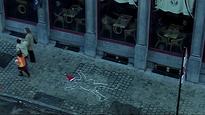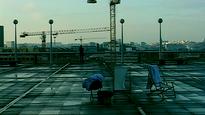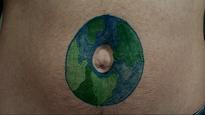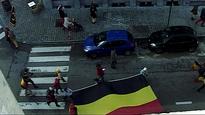ICI (UNE LETTRE À CHANTAL AKERMAN)
ICI is a parody which by its very nature might at first seem trivial or gratuitous. The film is a remake with a vengeance of Chantal Akerman’s Là-bas. ICI (French for ‘Here’) takes place not in Tel-Aviv – Akerman’s Là-bas (‘There’) – but in Brussels, where Van Paesschen lives. Instead of talking about the issues Akerman discusses – childhood, Jewish identity, health, a terrorist attack – Van Paesschen talks about Belgian colonisation and collaboration, Christmas, sunglasses and light deficiency disorder.
A more important difference lies in the respective films’ relationship to the real. Là-bas concerns a mixture of reality fragments: haphazard fixed camera shots of solitary life in an apartment shut off from light. Primarily, we see the window blinds, and that part of the world Akerman lets shine through them. These images are mixed with ‘real’-time phone calls in which Akerman, with her voice-off, comments on her stay in Tel-Aviv. There are also some rare outdoor shots.
ICI, by contrast, is a pure fiction. Like Là-bas, it is shot inside an apartment; the filmmaker is a solitary person, and he’s stuck in his role. But the story is made up. Clearly irritated by Là-bas’ aesthetics and refusal of political engagement, Van Paesschen reacts with a humorous, direct polemic. As the title states, the film is a letter to Akerman. ICI picks up Là-bas’ key moments and transposes them to a fictional situation in Brussels. Here, so the film’s story goes, our director is sitting in an apartment feeling depressed and misanthropic. He’s dealing with Christmas Weltschmerz and aggressively wards off unwelcome phone calls — while downing one Chimay Blue (9% alc) after another.
But ICI is not simply a caricature. Paralleling Akerman’s timing of shots, received phone calls and voice-offs, the film pitilessly deconstructs what Van Paesschen perceives as Là-bas’ penchant for lament and self-pity and its refusal to take a stand on Israeli and Jewish Diaspora politics. On aesthetic and political levels, ICI also functions as a genuine manifesto: an exemplum ex negativo of how, according to Van Paesschen, film, and in particular, documentary film, should not be made.
(Steve Tallon)
A more important difference lies in the respective films’ relationship to the real. Là-bas concerns a mixture of reality fragments: haphazard fixed camera shots of solitary life in an apartment shut off from light. Primarily, we see the window blinds, and that part of the world Akerman lets shine through them. These images are mixed with ‘real’-time phone calls in which Akerman, with her voice-off, comments on her stay in Tel-Aviv. There are also some rare outdoor shots.
ICI, by contrast, is a pure fiction. Like Là-bas, it is shot inside an apartment; the filmmaker is a solitary person, and he’s stuck in his role. But the story is made up. Clearly irritated by Là-bas’ aesthetics and refusal of political engagement, Van Paesschen reacts with a humorous, direct polemic. As the title states, the film is a letter to Akerman. ICI picks up Là-bas’ key moments and transposes them to a fictional situation in Brussels. Here, so the film’s story goes, our director is sitting in an apartment feeling depressed and misanthropic. He’s dealing with Christmas Weltschmerz and aggressively wards off unwelcome phone calls — while downing one Chimay Blue (9% alc) after another.
But ICI is not simply a caricature. Paralleling Akerman’s timing of shots, received phone calls and voice-offs, the film pitilessly deconstructs what Van Paesschen perceives as Là-bas’ penchant for lament and self-pity and its refusal to take a stand on Israeli and Jewish Diaspora politics. On aesthetic and political levels, ICI also functions as a genuine manifesto: an exemplum ex negativo of how, according to Van Paesschen, film, and in particular, documentary film, should not be made.
(Steve Tallon)




- Jaar 2007
- Duur 01:19:15
- Taalinfo
Ondertitels: English UK
Gesproken: Dutch/ Flemish
-
Kunstenaars